 who are these people anyway One of my favorite past-times is to imagine back stories for the people I see at coffee shops, parks, airports, you name it. I'm always speculating about their personal lives, the secrets they keep, their ambitions--either thwarted or realized. I also like to imagine people in completely different historical contexts. I never make them actual known historical figures, but I might connect them with someone famous. For example, I often look at my eighteen-year old students as World War I soldiers, or the people sipping wine as Macedonians, or the woman strolling down the street as a Druid priestess (not really sure what that looks like though) or the person who cut me off a French aristocrat (sorry about your impending beheading...) One of my friends for sure would be a disguised Han warrior, making tea for her family, then sneaking off to fight the Huns. (Or am I thinking of Mulan?) Another friend would have been an early suffragette, and still another, a village chieftain. A professor I know would have been an Abbott, living a scholarly life in a monastery. And so on. I always imagine my husband as a Viking ship-maker or one of Charlemagne's armor-makers. I wouldn't have met him, unfortunately, as I'd have been a servant in some great English manor or maybe teaching in a one-room schoolhouse on the prairie. Or taking bribes as a Chicago gumshoe. Something like that. A girl can dream. It's fun to speculate what we might have been like 50, 100, 1000, 2000, 10000 years ago! (Cave-man anyone?) Or for that matter, if we lived 5000 years in the future. What about you? How would you imagine yourself in a different time period?
9 Comments
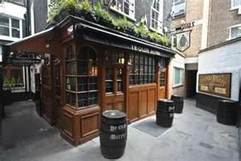 the murder may have happened here I had the opportunity the other day to contribute to a great blog, A Bloody Good Read: Where writers and readers of historical thrillers talk shop. There, I talked a little about a long ago murder and how a writer can fill in where historians fear to tread. Inspiration can be found in many places, I guess!  If you have a few minutes, check out the great entries by my colleagues: Nancy Bilyeau, author of The Crown (Touchstone, 2012) (she's also worked for all kinds of publications like Rolling Stone, In Style magazine, and Entertainment Weekly)... 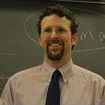 ...and Sam Thomas, an early modern historian specializing in midwifery. Sam's first novel, A Midwife's Tale (Minotaur/St. Martin's) is due out in early 2013. 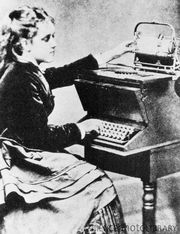 The biggest secret I ever kept from my husband was that I was writing a novel. We've been together close to 15 years and I'm sure from time to time I'd murmur something about 'having done some writing today' but I never talked much about the content. I guess at some point he knew I was working on a mystery of sorts, and maybe that it was set in seventeenth-century England, but really, that was about it, until a few years ago when I began to write in earnest. I didn't set out to keep my novel-writing a secret. The truth is, I wasn't writing every day (I do have two young children and well, a whole other career), but I also didn't view myself as a writer, let alone as an author. Sure, I "author" academic publications, but to call myself a "writer" felt somehow pretentious, even precious. I also felt that if I talked about my story, I would somehow lose it, that it would slip into the ether. And I still feel that way! (Case in point: my husband has now read the second book in the series, From the Charred Remains--the only person who's done so-- but he's yet to read the entire other novel I wrote while A Murder at Rosamund's Gate was out on submission to agents). So when I was writing Rosamund's Gate, I never really knew any other writers...or so I thought. I wasn't taking writing classes; I'd never participated in a critique group; and I hadn't yet encountered the vibrant online writing community that I now know about. So I've been pleased and surprised to discover, when I finally started telling people that I had written a book, how many other people were thinking about--or were actively engaged in--writing novels too. Childhood friends, neighbors, family members, colleagues, parents of my kids' friends, random acquaintances at the coffee shop--sometimes I wonder who's NOT writing a book. So what's YOUR book about? And I'm just so curious--what stage are you at? Brainstorming, dreaming, plotting, most of a draft done...or even further? I'd love to know! 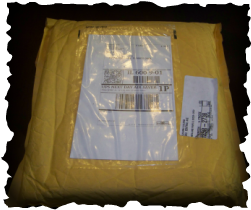 The other day, I experienced one of my odder moments as a writer. When I came home from work, I found a much anticipated package containing the page proofs for A Murder at Rosamund's Gate (that's not the odd part, that's the extremely thrilling part). 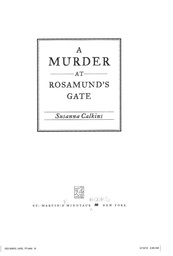 the inside cover page At this point, I can only make very minor edits. A word here and there, typos, minor grammatical changes--that's about it. The book is nearly ready--all 340 pages of it. A heady and strange mixture of emotions regularly accompany this realization. But the odd thing? Later that same evening, I happened to be poking through some old files and I came across the very first handwritten draft of this novel, which I began in 2003. All scratched up, full of non sequiturs and dangling thoughts, somehow this mess became an actual novel. Holding that handwritten draft alongside my proofs was definitely a surreal moment, and it was hard not to compare the original version with the final. To be sure, some things were different. My heroine was originally named Abigail, although somewhere along the way, she became Lucy. Another main character saw his name changed several times too, from Thornton to William to Adam. I also had a prologue then (which I've since eliminated, as I've mentioned before), and even more interestingly--I had an entirely different adversary than the one who crept into the pages later. In fact, the main crime was different, although I had written emphatic notes to myself--'Must take place during seventeenth-century plague and Great Fire of London.' So the setting never changed, nor did my original inspiration. The book took me ten years to write. Honestly, I never thought when I began this story that I would even finish it, let alone that it would be out in the world. But the proof, I guess, is in the proofs. 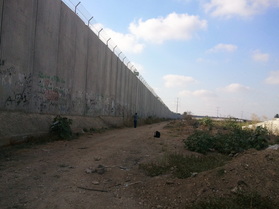 The wall through Qalquilya The wall through Qalquilya The first time I read Faulkner's As I Lay Dying I was fascinated by the fifteen or so perspectives on the same event: the death of Addie, the sickly matriarch of a poor Southern family. There's a challenge, however, to acknowledging multiple perspectives of an event, to recognizing the value of competing narratives, even when multiple points of view can do much to advance a story. Recently, I've been thinking a lot about competing narratives, as I've traveled throughout Palestine and Israel as part of a higher education-related initiative I've been involved with through my "day" job. Last year, on my first trip to this highly-fraught region, my team was invited by several of our new colleagues--professors from a large Palestinian university-- to visit their communities. We found their families and neighbors to be warm, friendly--and extremely welcoming to strangers who could barely speak ten words of Arabic altogether. On one occasion, we visited Qalquilya, one of the communities divided by the Wall ("security fence"), and a town at the forefront of the troubles in the West Bank. Designed to separate the Palestinians in the West Bank from the rest of Israel, the Wall certainly now stands as a palpable symbol of the overwhelming distrust, fear, anger and sadness that has kept these peoples apart. Our colleague showed us around this town where she'd grown up, pointing out the small plot of land where her family still managed to grow vegetables. Under the hot sun, we sat beside the Wall, sipping mint lemonade, watching her neighbors shear sheep and her little niece kick a ball among the trash and compost. I remember this little girl asking me "What was it like, beyond the Wall?" As a Palestinian, she had no ready means for a visa that would allow her to see what was beyond the Wall for herself. Last week, on my follow-up visit, my group was able to take a trip to Haifa-- a city on the Mediterranean decidedly not within the West Bank. (The irony of being a foreigner--we could travel anywhere we wanted). Along the way, as we drove along the well-maintained Israeli highway, many tour buses passed us. I could see the tourists inside taking pictures of the Wall which, from our current vantage point, looked exactly like the walls you might see around a maximum security prison. I have no doubt the Wall looked scary and ominous. (Indeed, I met an American on the plane ride home who whispered to me how he had seen the Wall, with the air of someone who had braved something unimaginable.) The next moment, though, our tour guide mentioned that we had just passed Qalquilya--I was shocked. And profoundly disturbed. We could see the Wall, but nothing of the humanity within. Somewhere in there, my colleagues' little niece was playing. Or maybe she was staring at the Wall, still wondering who was out there, and why she was locked inside. I won't pretend to understand the complexities of Israeli-Palestinian relations. But clearly, there is more than one "true" narrative. I believe that writers of all types, whether of fiction or non-fiction, would do well to consider an event from more than one perspective. Few writers wield Faulkner's skill of course, to imagine the same event from 15 separate angles. And I'm not sure I've been brave enough to try. But questioning what is known, questioning one's beliefs, and seeking different takes on a subject, is crucial--for writers, and certainly for critically-thinking human beings. What do you think? Have you seen instances where using multiple perspectives has worked well? How? |
Susanna CalkinsHistorian. Mystery writer. Researcher. Teacher. Occasional blogger. Categories
All
Archives
May 2023
|
 RSS Feed
RSS Feed